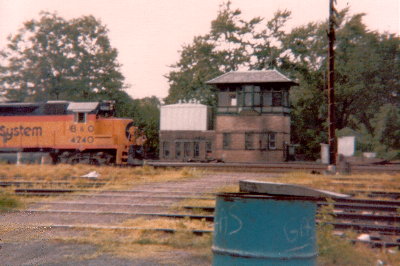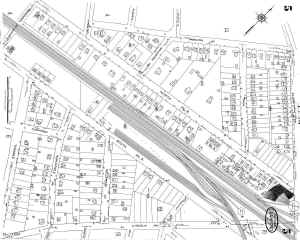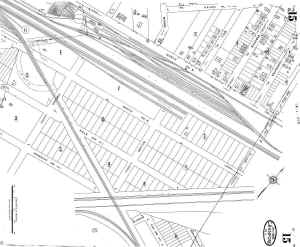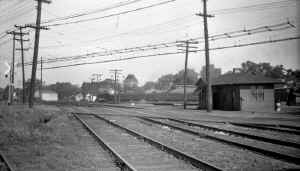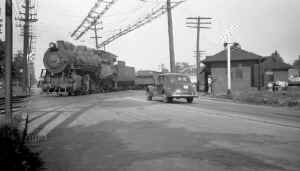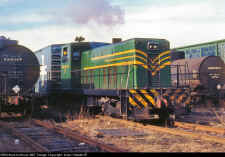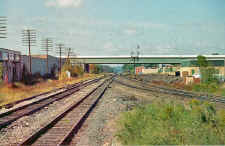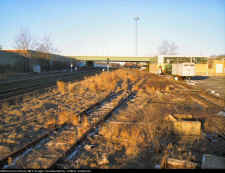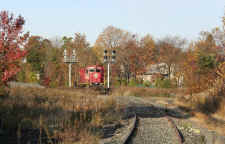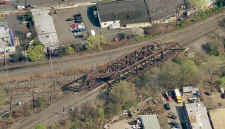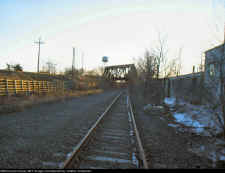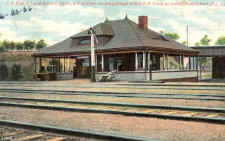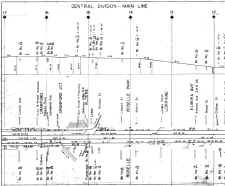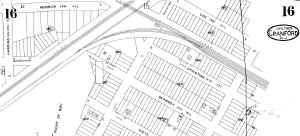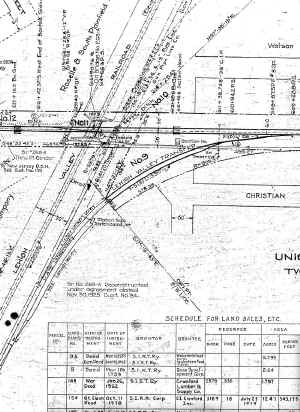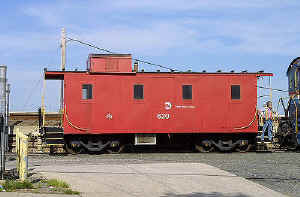| Aldene
Plan
The CNJ in the mid-1960s, which
claimed it was losing a considerable sum of money on its ferry operation
between Liberty Street, N.Y. and its Terminal in Jersey City, NJ, even
with the State picking up some of the cost in the form of subsidy, was
in a permanent downward spiral that would lead to the railroad's filing
for bankruptcy early in 1967.
Desperate to cut costs, the CNJ turned
to the state who created a "railroad transportation division"
within the highway commission headed up by Dwight R. G. Palmer, who was
placed in charge of preserving rail commuter services as a cheaper
alternative to a new highway building program.
Palmer's office produced a report
called "The Rail Transportation Problem" stating that the
state should partiality subsidize service until more fundamental changes
could be made.
One of these "fundamental
changes" for eliminating the ferry service were studied, and in
1965 work was begun on the "Aldene Plan" whereby CNJ trains
would be routed up the Lehigh Valley at Aldene, over to the former PRR
at "Hunter," terminating at Newark's Penn Station, leaving
passengers the option of taking a PRR train to Penn Station, N.Y. or the
PATH Tubes, if their destination was downtown.
It would involve the building of a
ramp to connect the CNJ and the Lehigh Valley Railroad at the site of
the recently abandoned Aldene Station to reroute trains bound for Jersey
City to follow the LV to the Pennsylvania Railroad mainline (now the
Northeast Corridor) and on to Newark Penn Station where passengers could
transfer to PRR trains into New York Penn Station. This would allow the
CNJ to abandon its labor-intensive ferry service and much
of its Communipaw Terminal in Jersey City, and all local trains
operating east of Cranford, all totaling up to about $1.5 million in
annual savings.
As a concession to a few hundred
factory workers that worked in various areas along the line, a set of
Budd Rail Diesel Cars would continue to operate between Cranford and
Bayonne until the end of that service on August 6, 1978.
Opening day for the Aldene Plan was
officially announced for Monday, May 1, 1967 but a full-service
rehearsal occurred the day prior (a Sunday to avoid the commuter rush).
The CNJ operated push-pull consists with a cab car leading eastbound.
Today, operations are nearly identical. Passengers bound for New York
must disembark at Newark and change either to a Northeast Corridor or
North Jersey Coast Line train operated by New Jersey Transit to New York
Penn Station or PATH trains to the World Trade Center. The change of
train is necessary as the Raritan Valley Line has never been
electrified, and only electric trains can operate into New York Penn
Station.
Also affected by the change was the
Reading Company's Crusader service from Philadelphia, which operated
over the CNJ via trackage rights. After the Aldene Plan went into
effect, it began to operate into Newark Penn Station, continuing until
1981 as a through service, and then as a connecting train from West
Trenton through 1982. New Jersey Transit has explored reactivating this
service as the West Trenton Line.
The Aldene Connection is single track,
although it is graded to allow a second track to be added.
Considerable work had to be done
before service began on May 1, 1967, mostly on the former Lehigh Valley,
where a station had to be built at Roselle Park, along with the
elimination of several grade crossings. (Chestnut Street and Locust
Street for example)
In addition, a connecting track had to
be built at Aldene, connecting the CNJ with the L.V., and since the
volume of trains was too large for the two-track Lehigh Valley,
signaling improvements were made so trains could run either way on both
tracks (rule 261-TCS). A gauntlet track was needed on #2 at Roselle
Park, since wide shipments would be too close to the island platform.
And last, but not least, a coach yard had to be built at Harrison, NJ
(just east of Newark) to store equipment between trips. Since the CNJ/LV
connection at Aldene was only a single track, it often became a
bottleneck at rush hour, with east bounds sometimes waiting for
westbounds before they could "go up the Hill." Two tracks were
planned, but never installed, contributing to headaches for the
operators at "EXCEE" and "NK" towers.
Former CNJ Bay Head trains ran over
the PRR tracks from Newark to Perth Amboy, via Rahway and the PRR's
Perth Amboy and Woodbridge branch.
So, with all the equipment in place,
the Aldene Plan was operational on May 1, 1967, which was a Sunday.
Trains operated on a weekday schedule, giving crews, towermen and some
commuters a chance to give it a "dry run." |


